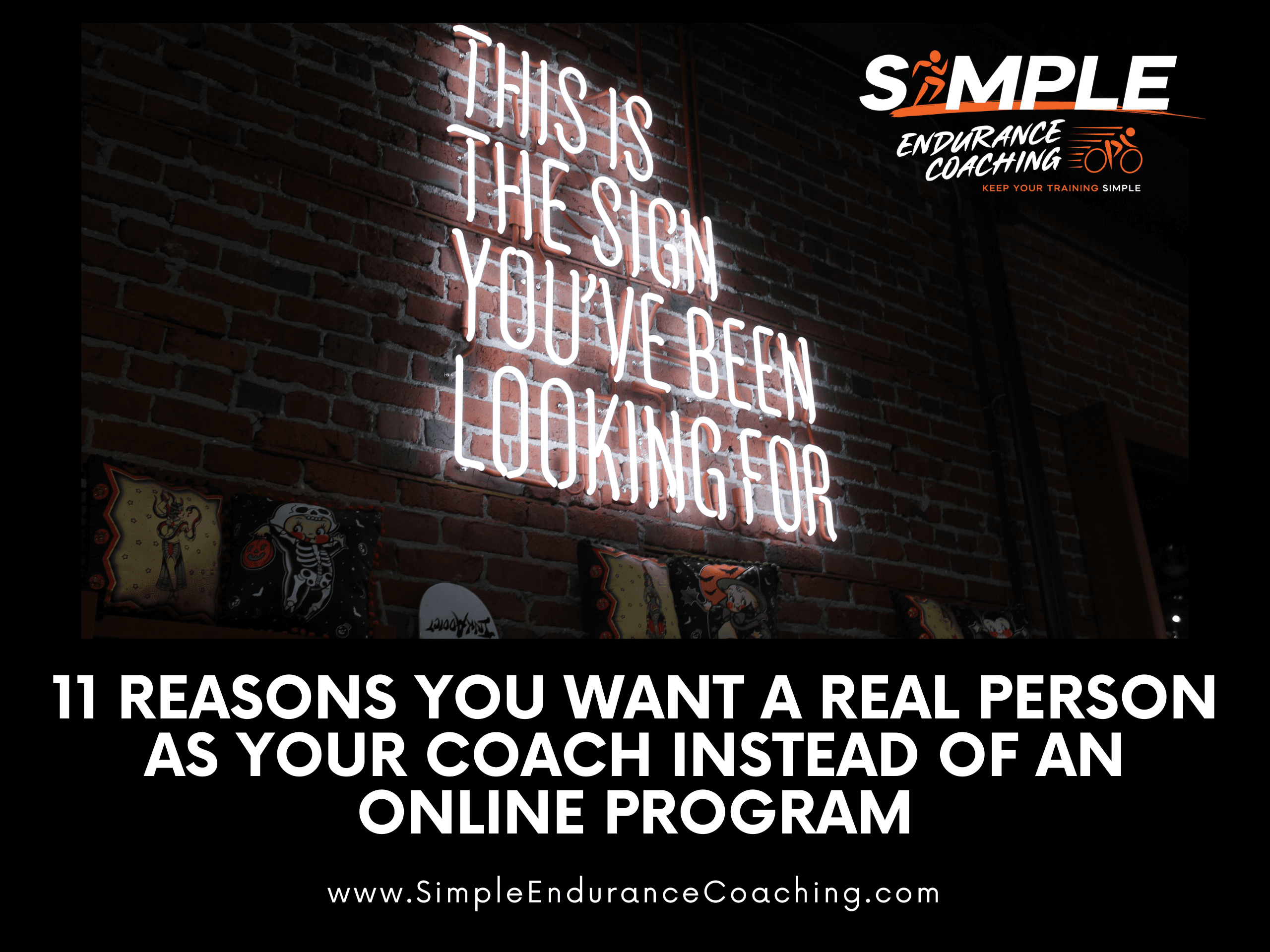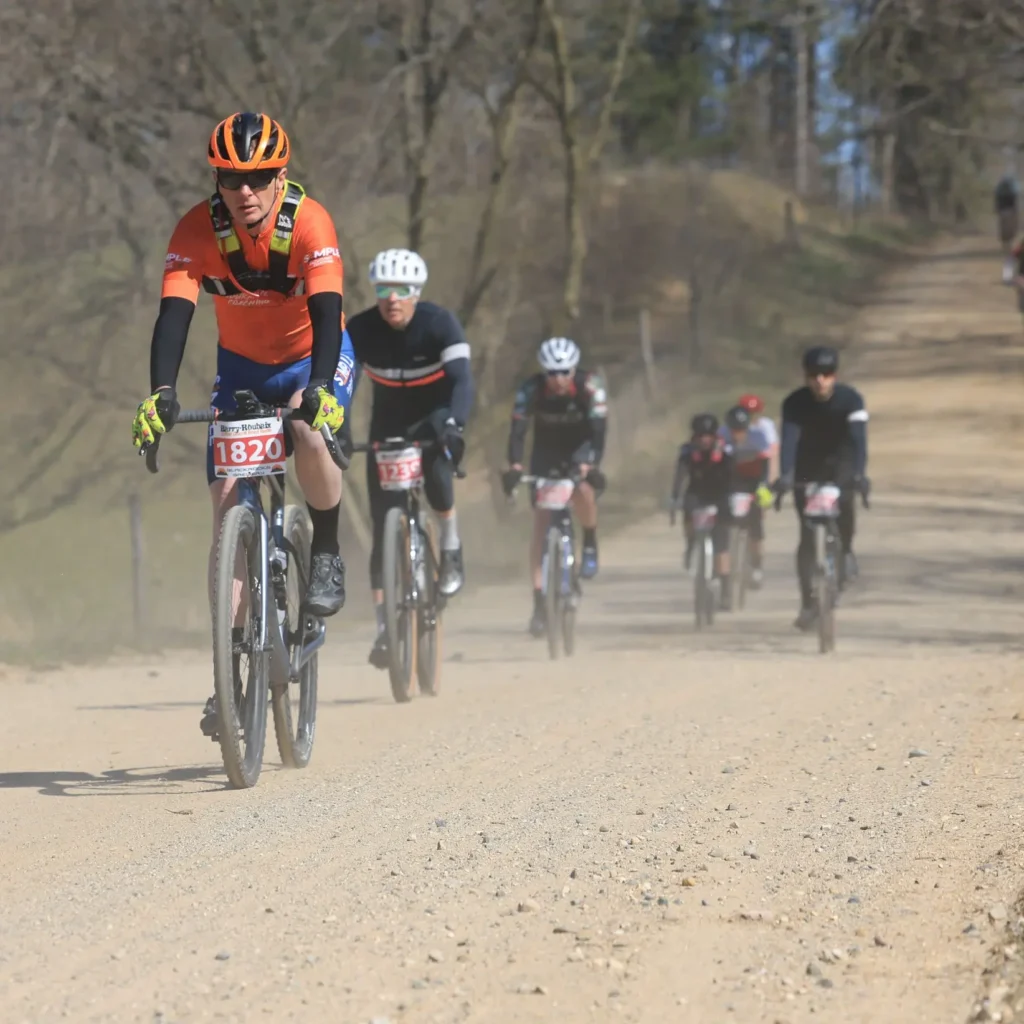Popular online training programs can be incomplete
With the proliferation of online training programs, especially ones guided by AI (artificial intelligence), you have so many choices when you’re looking at completing some audacious challenge goal or adventure.
Honestly, if you use one of these programs, you will likely improve your performance, simply for the fact that you’re working out more consistently.
Training programs are designed for the average, the middle of a bell curve.
And that may be enough for you.
But a program might not help you avoid overtraining – or undertraining, help your motivation and drive, or answer your questions before a race or event.

I have a friend I see regularly.
He’s using a popular training program for some cycling goals.
And while it’s helping him get fitter, he’s constantly telling me how tired he is.
The program, for his needs, is just so incomplete.
He’s why I’m writing about why you may need a coach.
He desperately needs someone to pull everything together into a consistent training program designed for his specific needs and goals.
1. Individualized training plans
The most important reason that everyday endurance athletes like runners, cyclists, and triathletes need a coach is an individualized training plan.
Every program a coach writes is individualized for the client.
Every person is different in terms of their thresholds, VO2max, overall strength and mobility, experience, and general fitness.
There’s no way an off-the-shelf training program can meet all these needs.
I work backward from a client’s target event and plan workouts that are needed for that event and for that client.
One of my clients, who is training for a half-Ironman, broke her wrist and can no longer train in the pool. I am able to adjust her training to focus on running and cycling instead of swimming. Plus coaches can adjust training if there’s illness or travel.
2. Progress monitoring
Coaches should understand the numbers that tell how you respond to your training.
Some of us respond well to hard intervals, and some of us respond better to long efforts.
Everyone is different, so it’s hard to know how you’ll respond to a training program.
A coach understands what the data is saying and can adjust as needed.
AI programs can do the same thing, though!
This winter, for example, my smart trainer wasn’t warm and I was suddenly able to do a Zwift race at the front with more power than ever.
I found out later that you need to allow some time for the trainer to come up to the right temperature, otherwise your numbers will be way off.
That said, my training program took one look at my “new” numbers and adjusted my FTP up to a number I’ll never be able to sustain.
So another reason you may need a coach is that we are able to understand the progress – or lack thereof – that you are making with your training.
3. Accountability
If you’re paying someone to help you improve your fitness, you make an investment in the outcome.
You’re far more likely to do the work, even when you don’t feel like it.
You know the coach is going to open Training Peaks, see that you didn’t do the workout, and check in with you.
The accountability will get you on the road or bicycle when you’d rather eat a giant bowl of ice cream.
There is a lot of research that suggests that putting your proverbial money where your mouth is when it comes to goals is far more likely to produce results.
4. Increased self-confidence
With the experience and understanding of a coach, we can help you find the self-confidence you may have been missing to dramatically improve your performance.
We are your biggest cheerleader.
When I was a middle school teacher, helping reluctant kids do the hard work of reading and writing AND thinking was the best part of the job.
There’s nothing quite like supporting a person to realize they can do hard things.
5. Communication
When a client understands that a coach is in her or his corner, available for questions, concerns, worries, and breakdowns, the athlete can focus on the program.
With a coach, a client can have regular communication through email, phone, online video calls, texts, and messages in Training Peaks.
So you may need a coach if you feel a little lost in your training.
And that reassurance leads to better goal-setting and self-confidence, the next two on the list.
6. Fatigue monitoring
One of the biggest challenges is knowing when you’re tired – or when you’re not going hard enough.
If you’re off the couch, for example, and start a training program, you might suddenly find yourself in a hole of fatigue.
Yet the program, even if it’s driven by an AI algorithm, might tell you to keep working out.
That’s a recipe for disaster.
Likewise, your program might not be hard enough for you or may not stress the right energy systems for what you need.
There are days when you’re not going to feel like working out, and that’s where #6 comes in.
But there are days when you are tired, and you just need a break.
You may need the coach to keep you honest – and fresh.
7. Goal-setting
We work a lot on setting individualized goals based on the process.
We don’t just set random goals and leave them.
We set out the ways someone has to change in order to achieve those goals.
What is the process by which someone develops new skills and abilities in order to do something they’ve never done before?
That’s the beauty of building a relationship with a coach.
8. Yoga and strength for full-body fitness and mobility
Some of the popular training programs include yoga and strength.
I appreciate that, and I never know how often the person is actually completing the work.
Every training program I create has an individualized strength training and yoga plan to build overall full-body fitness that changes with the time of year.
Strength training and yoga help everyday athletes become healthier in general.
And that allows them to train more – and get faster.
9. Experience of training coach for cyclists
Most coaches, especially me, have done all the dumb things so you don’t need to.
Plus we can give you the big picture of your training and process when a workout or race doesn’t go to plan.
Because that’s going to happen.
Regardless of our plans and training, we get sick, we don’t sleep well, etc., and our race performance gets affected.
Plus, I’ve been the mental head case before and after a race, and a coach can help you put some perspective on your training.
I’ve been helping a client, for example, see her daily workout as a success, regardless of the numbers, because she did the workout, and that’s better than a year ago.
10. Race plans
Coaches have been there.
They’ve done the races, they have the experiences in order to help you achieve your best result.
I’ve done running races from 5ks to marathons.
I’ve done all kinds of cycling races.
We understand, especially when we’ve gotten to know you, what you may need to plan and prepare for to do your best.
11. Nutrition
Many coaches have a good understanding of the nutritional needs of everyday athletes.
And with the full metabolic testing that we do, I get a good picture of your nutritional needs doing your workouts.
We work together to learn how you use nutrition to your advantage, whether that’s to fuel harder work or to lose weight.
And we can come up with specific plans for your events to make sure you have fun and meet your goals.
You may need a coach as an investment in you
I’m not cheap.
There are coaches who cost a whole lot more, and probably some who cost less.
But my monthly rate is still an investment.
And that’s what it is: An investment in yourself.
It sounds cliche’, but it’s true: You’re worth it.
Regardless of your experience or ability level, getting a coach is going to help.
You’re going to make progress.
And, I like to think, if you work with me at Simple Endurance Coaching, we can change your life.
True, the online programs cost less, and, again, to be cliche, you get what you pay for!
The top three reasons you may need a coach as an everyday endurance athlete
- Individualized training plans: One of the most important reasons that everyday endurance athletes like runners, cyclists, and triathletes need a coach is an individualized training plan.
- Progress monitoring: Coaches should understand the numbers that tell how you respond to your training.
- Accountability: If you’re paying someone to help you improve your fitness, you make an investment in the outcome.
Need more?
Unlock the secrets to mastering gravel racing with our FREE Guide to Gravel Racing! Get yours here.
BOOK A CALL so we can discuss your goals, answer questions, and talk about making your endurance training more effective, fun, and Simple.
Paul Warloski is a:
- USA Cycling Level 1 Advanced Certified Coach
- RRCA Running Coach
- Training Peaks Level 2 Coach
- RYT-200 Yoga Instructor
- Certified Personal Trainer
- Certified Nutrition Advisor




